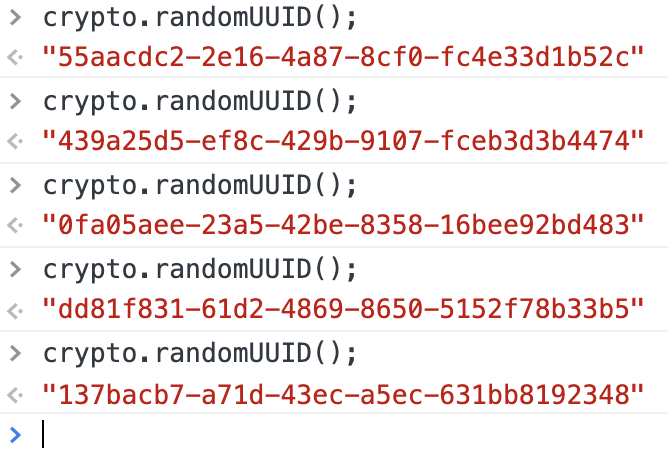从 Chome92 版本开始,crypto 模块已经支持randomUUID()方法了。

1. 以前的方式 #
在前端 web 中,我们在生成 uuid 时,通常都会使用时间戳或 Math.random()。例如在 stackoverflow 上,有段很出名的代码:How to create a GUID / UUID,就是Math.random()来生成的:
function uuidv4() {
return 'xxxxxxxx-xxxx-4xxx-yxxx-xxxxxxxxxxxx'.replace(/[xy]/g, function (c) {
var r = (Math.random() * 16) | 0,
v = c == 'x' ? r : (r & 0x3) | 0x8;
return v.toString(16);
});
}
console.log(uuidv4()); // "f94adc58-89b7-4c70-bc92-2935ea6fb5d2" 格式一样,但每次都不一样
每个位置都调用一次 random()方法。
2. randomUUID #
现在,Chrome 从 92 版本开始,已经原生支持 uuId 方法了,即crypto.randomUUID()。
crypto.randomUUID();

以后想获取一个随机值,或者用来标识设备(要求不高的前提下)的时候,就可以用这个randomUUID()方法。
3. 总结 #
randomUUID()这个浏览器提供的原生确实很好用,而且符合 v4 版本的格式。
但就是有一个缺点:兼容性太差。不止其他浏览器不支持,即使在 Chrome 浏览器,也只有从 92 版本开始,才能使用。

不过相信不久的将来,其他浏览器也会支持这个方法的。
我们来写一个前端获取uuid的方法。
- 优先使用crypto.randomUUID;
- 没有的话,使用优先使用crypto.getRandomValues;
- 使用Math.random()进行兜底;
const generateUUID = () => {
if (typeof crypto === 'object') {
if (typeof crypto.randomUUID === 'function') {
// https://developer.mozilla.org/en-US/docs/Web/API/Crypto/randomUUID
return crypto.randomUUID();
}
if (typeof crypto.getRandomValues === 'function' && typeof Uint8Array === 'function') {
// https://stackoverflow.com/questions/105034/how-to-create-a-guid-uuid
const callback = (c) => {
const num = Number(c);
return (num ^ (crypto.getRandomValues(new Uint8Array(1))[0] & (15 >> (num / 4)))).toString(16);
};
return '10000000-1000-4000-8000-100000000000'.replace(/[018]/g, callback);
}
}
let timestamp = new Date().getTime();
let perforNow = (typeof performance !== 'undefined' && performance.now && performance.now() * 1000) || 0;
return 'xxxxxxxx-xxxx-4xxx-yxxx-xxxxxxxxxxxx'.replace(/[xy]/g, (c) => {
let random = Math.random() * 16;
if (timestamp > 0) {
random = (timestamp + random) % 16 | 0;
timestamp = Math.floor(timestamp / 16);
} else {
random = (perforNow + random) % 16 | 0;
perforNow = Math.floor(perforNow / 16);
}
return (c === 'x' ? random : (random & 0x3) | 0x8).toString(16);
});
};